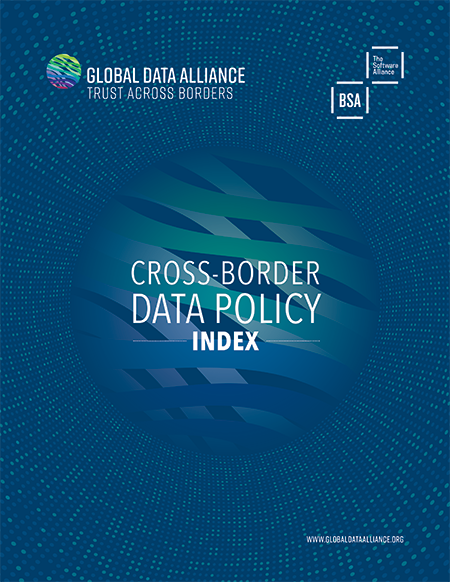Overview
The ability to responsibly transfer data around the globe supports cross-border economic opportunity, cross-border technological and scientific progress, and cross-border digital transformation and inclusion, among other public policy objectives. To assess where policies have helped create an enabling environment for cross-border data and its associated benefits, the Global Data Alliance has developed the Cross-Border Data Policy Index.
The Cross-Border Data Policy Index offers a quantitative and qualitative assessment of the relative openness or restrictiveness of cross-border data policies across nearly 100 economies. Global economies are classified into four levels. At Level 1 are economies that impose relatively fewer limits on the cross-border access to knowledge, information, digital tools, and economic opportunity for their citizens and legal persons. Economies’ restrictiveness scores increase as they are found to impose greater limits on cross-border data, thereby eroding opportunities for digital transformation while also impeding other policy objectives relating to health, safety, security, and the environment.
Cross-Border Data Policies Around the World

Level 1: Relatively Open Digital Policies
Open to Cross-Border Digital Economic Opportunity and Digital Transformation
The 45 Level 1 economies include Argentina, Australia, Brazil, Canada, Chile, Japan, Mexico, Peru, New Zealand, Norway, Singapore, Switzerland, Taiwan, the UK and the US, among others. Many Level 1 economies have maintained open cross-border digital policy environments and have adopted optimal policies regarding future digital transformation and digital inclusion.
- Algeria
- Angola
- Argentina
- Australia
- Bolivia
- Botswana
- Brazil
- Burkina Faso
- Canada
- Chad
- Chile
- Colombia
- Congo
- Costa Rica
- Ecuador
- Gabon
- Ghana
- Iceland
- Israel
- Japan
- Kenya
- Lichtenstein
- Madagascar
- Malaysia
- Mauritania
- Mexico
- Morocco
- Namibia
- Niger
- Norway
- Paraguay
- Peru
- Philippines
- Singapore
- Sri Lanka
- Switzerland
- Taiwan
- Tanzania
- Thailand
- Tunisia
- Uganda
- Ukraine
- Uruguay
- United Kingdom
- United States
Level 2: Restrictive
Decreasing Cross-Border Digital Openness Impedes the Potential of Cross-Border Data to Support Economic and Other Policy Objectives
The 33 Level 2 economies are Bangladesh, Nigeria, Senegal, South Africa, South Korea, and the United Arab Emirates, along with the 27 Member States of the European Union. Beneficially, many of these economies have assumed a forward-leaning policy stance on digital policy. Regrettably, this policy stance has often also included an embrace of unnecessary cross-border digital restrictions.
- Bangladesh
- European Union member (Austria, Belgium, Bulgaria, Croatia, Cyprus, Czech Republic, Denmark, Estonia, Finland, France, Germany, Greece, Hungary, Ireland, Italy, Latvia, Lithuania, Luxembourg, Malta, Netherlands, Poland, Portugal, Romania, Slovakia, Slovenia, Spain, and Sweden)
- Nigeria
- Senegal
- South Africa
- South Korea
- United Arab Emirates
Level 3: Highly Restrictive
Numerous and Diverse Restrictions Substantially Impede Cross-Border Digital Transformation, Sustainable Economic Development, and Other Policy Priorities Across Multiple Sectors
The six Level 3 economies are India, Indonesia, Kazakhstan, Saudi Arabia, Turkey, and Vietnam. Economies in this group have adopted cross-border data barriers characteristic of Level 2 economies, but they have done so with greater frequency and intensity.
- India
- Indonesia
- Kazakhstan
- Saudi Arabia
- Turkey
- Vietnam
Level 4: Extremely Restrictive
Comprehensive and Systemic Cross-Border Data Restrictions Across the Economy and Society
The two Level 4 economies are China and Russia. Cross-border data barriers in Level 4 economies are more numerous and more onerous than anywhere else. These barriers typically cover more sectors and more data types, may include ad hoc pre-transfer governmental approval requirements, and depend upon often unfettered governmental discretion to enforce vague legal standards under the threat of onerous penalties. These barriers are sometimes explicitly predicated on national security and authoritarian maintenance over “social order.” They frequently contain few, if any, due process safeguards against intrusive governmental decisions on data access or data transfer. In these contexts, it can be difficult for enterprises to predict their own legal exposure or have confidence that future data transfers of business-related information will be permitted.
- China
- Russia
Cross-Border Data Policy Benefits and Costs
Benefits of Cross-Border Data
Costs of Cross-Border Data Restrictions
Methodology
The Cross-Border Data Policy Index assesses, across several text-based metrics, each economy’s national laws, regulations, and other measures that either restrict data transfers or mandate data localization. The Index is built on legal analyses of measures relating to artificial intelligence, cybersecurity, privacy, law enforcement access, and international trade (among other topics). Read more >>
News & Resources
- Press Release: Global Data Alliance Report Ranks Global Economies By Data Transfer Restrictiveness, July 19, 2023
- MLex: New GDA Report Shows Impact of Data Restrictiveness in Global Economies, July 19, 2023
- Politico Pro Morning Tech: GDA’s New Data Restrictiveness Index Analyzes Economic Risks of Data Localization, July 19, 2023
Contact Information
AMERICAS
Joseph Whitlock
Executive Director
APAC
Tham Shen Hong
Manager, Policy
EMEA
Irma Gudziunaite
Director, Policy












